Apple is researching the use of "deployable feet" on the MacBook Pro to aid cooling, according to a newly-published patent application.
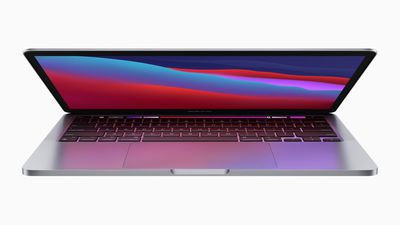
The patent application, first spotted by Patently Apple, is titled "Deployable Feet for Display Articulation and Thermals Performance" and outlines how a MacBook Pro could feature feet that move to raise up the rear of the device. Apple's deployable feet are able to extend by at least 3.8 millimeters, thereby significantly increasing airflow underneath the machine.
The filing explains how, in one embodiment, the MacBook Pro's display hinge could be connected to the deployable feet, so that the feet deploy relative to the mechanical movement of the lid.
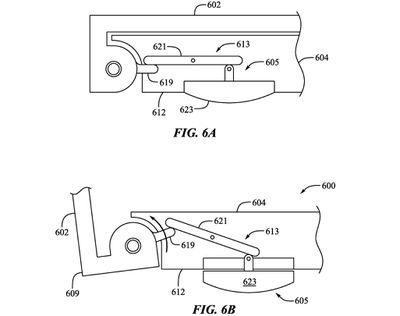
In other embodiments, the feet could be deployed via a gear train, pneumatics, electro-mechanics, or simply flipped out manually by a user. The filing also suggests that the entire base of a MacBook Pro could expand, rather than individual feet.
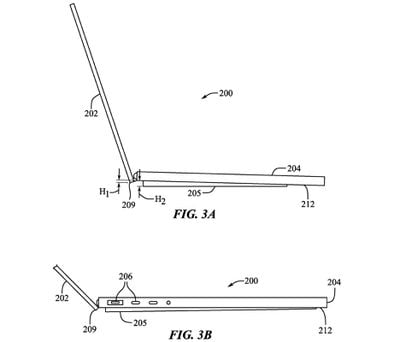
The patent application explains that deployable feet can be an "efficient means of cooling the device" without taking up internal space with large components such as fans, ensuring that the MacBook remains "thin and lightweight while simultaneously including numerous features delivering high performance."
As the number and performance of internal components increases, so do thermal and other demands on the electronic device. Thus, there exists a demand for efficient usage of space within an electronic device, and efficient means of cooling the device. Accordingly, it can be desirable for an electronic device to include deployable features that can both increase clearance of the base portion and also improve the efficiency of the internal volume of the base portion, while maintaining a portable and sleek form factor.
In an embodiment where the deployable section is larger, the patent states that "the deployable feature can at least partially define a vent when deployed," potentially adding a dedicated vent as well as increasing natural airflow underneath the device.
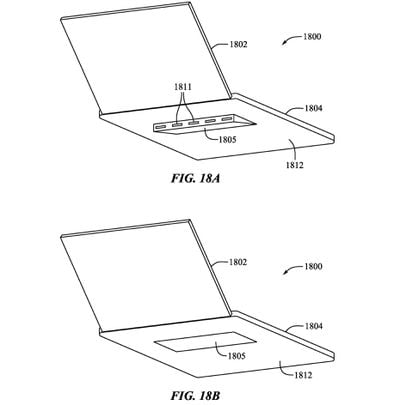
In addition, Apple explains how the deployable feet tie into the Mac's software. When in a deployed position, the Mac's processor may be permitted to get hotter to deliver better performance, due to the increased airflow. In Macs that do feature a fan as well as deployable feet, the fan's speed would be "at least partially" determined based on the extent of the deployment.
The electronic device can include a sensor that detects at least one of a temperature or a processing speed of the electronic device, and provides the signal in response to the detection. The electronic device can further include a fan, wherein a speed of the fan is at least partially based on a state of the deployable feature.
The filing also addresses the potential waste of space within a MacBook that deployable feet could cause. It proposes that when in the deployed position, the internal space used to store the feet may be repurposed to be "usable by an antenna or a speaker."
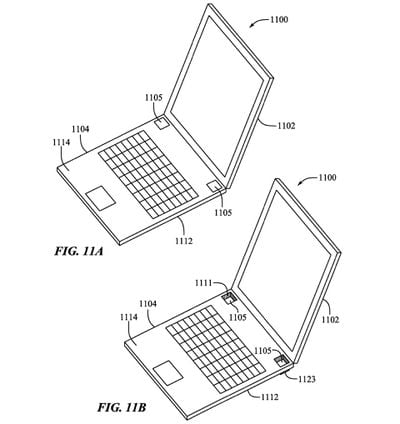
The design has the added advantage of giving the display hinge more clearance to rotate, as well as improving the angle of the device for typing and raising the height of the display for greater comfort.
While Apple's patent applications cannot be taken as sure evidence of what the company is intending to add to its devices, there may be good reason to suggest that a feature such as deployable feet could be implemented on MacBooks at some point in the future.
Apple is demonstrably interested in passive cooling. The company has explored passively-cooled laptops starting with the 12-inch MacBook in 2015, and most recently with the latest MacBook Air, which features no fan or vents on its base for cooling. Moreover, as the internal components of MacBooks are becoming more compact with the advent of Apple silicon, alongside improved battery life, it is perhaps more likely that deployable feet could be justified within a future Mac laptop.
Apple is believed to be working on high-performance custom silicon processors for future MacBook Pro models. Unlike the M1 chip, which generally runs very cool and powers Apple's entry-level Macs, the next-generation Apple silicon expected to come to the MacBook Pro is likely to have much more demanding thermal requirements.
Deployable feet could be one way in which Apple is able to improve the thermals of its passively cooled MacBooks, as well as enable even higher-performance on its Pro machines with active cooling, at some time in the future.























